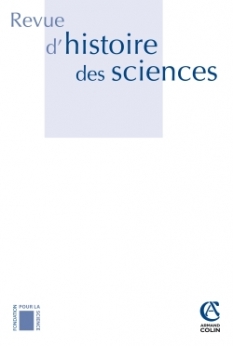
Revue d'histoire des sciences - Tome 65 (2/2012)
Pour acheter ce numéro, contactez-nous
Recevez les numéros de l'année en cours et accédez à l'intégralité des articles en ligne.
Avant 1852, l’« altruisme » n’existait pas en Grande-Bretagne ; et quand il fit son apparition, ce fut comme un produit d’importation française. C’est Auguste Comte qui forgea le mot altruisme, terme renvoyant à la fois à la science cérébrale et à une religion humanitariste. Dans ce mot se retrouvaient liées ses conceptions de la biologie et de la sociologie, de la science du cerveau et de la religion de l’Humanité. Comte résumait ainsi ses objectifs dans son Système de politique positive : «Vivre pour autrui, devient ainsi le résumé naturel de toute la morale positive, dont la biologie doit déjà ébaucher le principe universel, mieux dégagé alors des diverses influences perturbatrices. » L’introduction de l’ altruisme dans l’Angleterre victorienne permit à ce terme fondamental du vocabulaire comtien, marqué par ses origines française et positiviste, de se répandre dans des contextes intellectuels bien plus larges. Mot d’ordre scientifique, politique et religieux qui a commencé à se diffuser en Grande-Bretagne à partir des années 1870, l’« altruisme » était devenu, au début du XXe siècle, un terme bien établi du discours éthique et scientifique dans tout le monde anglophone. Dans cet article, je m’interroge sur le rôle joué par ce terme dans les écrits de Comte et sur la manière dont il a pénétré le vocabulaire des intellectuels britanniques (en particulier si l’on pense à la réputation très ambivalente qui a été celle de Comte durant cette période), en explorant l’impact de Comte sur les œuvres de tout un groupe de penseurs et d’écrivains britanniques, tels John Stuart Mill, John Henry Bridges, Henry Sidgwick et Herbert Spencer.
« Altruism » did not exist in Britain prior to 1852, and when the term came into currency, it was as a term borrowed from French. Coined by Auguste Comte, « altruism » drew both on cerebral science and humanistic religion. It brought together his visions of biology and sociology, of the science of the brain and the religion of Humanity. Comte summarized his aims in the following words, in his Système de politique positive : « To live for others thus becomes a natural summary of the whole of positive morals, of what biology is to outline now the universal principles, thus freed more clearly from various troubling influences. » Comte’s keyword, altruism, passed from its French, positivist origins to a broader intellectual context in Victorian Britain. « Altruism » became a scientific, political, and religious watchword in Britain from the 1870s onwards, and by the early twentieth century it was a well-established term in ethical and scientific discourse throughout the English-speaking world. This article asks what role the term played in Comte’s own writings, and how it made its way into the vocabulary of British intellectuals, especially given the very mixed reputation that Comte enjoyed in this period, exploring the impact of Comte on the works of a range of British thinkers and writers, including John Stuart Mill, John Henry Bridges, Henry Sidgwick and Herbert Spencer.